Reply To:
Name - Reply Comment
Last Updated : 2024-04-25 00:00:00
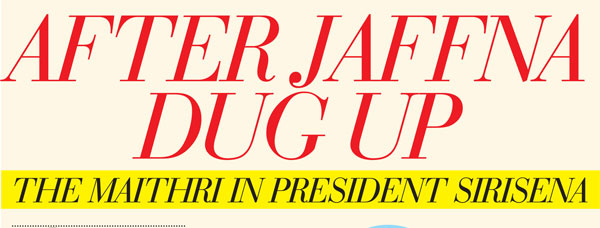
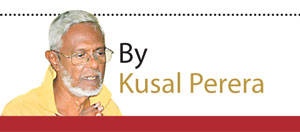 Since the shooting of two university students in Jaffna on Thursday, October 20 late night, there were interesting captions in news stories in both Sinhala and English media (unfortunately I cannot read Tamil).
Since the shooting of two university students in Jaffna on Thursday, October 20 late night, there were interesting captions in news stories in both Sinhala and English media (unfortunately I cannot read Tamil).
A week ago the same media wrote about the “outburst”, “slander” or “anger” of President Sirisena and went to discuss its “fallout”.
This time it was about President Sirisena blocking Police cover up of student killings”.
About President ordering an impartial inquiry over Jaffna University students’ deaths. A popular website said, “President calls for probe….”and followed it up with a catchy news story captioned “….IGP ready to
be sacrificed”.
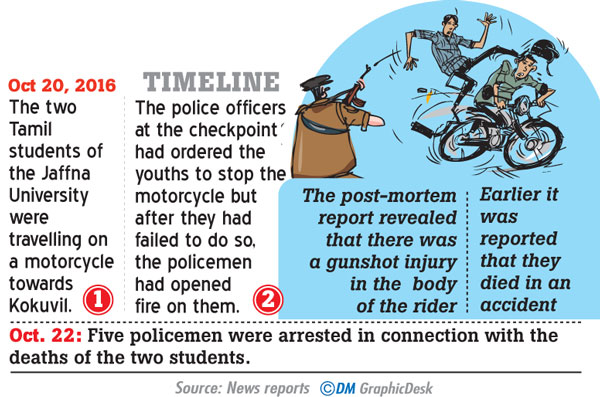
When reports came out from Jaffna of Vijeyakumar Sulakshan’s and Nadarajah Kajan’s deaths, the Police media unit in Colombo immediately said the youth travelling on a motor bike had crashed onto a wall, were fatally injured.
The autopsy carried out nevertheless found the student who rode the bike had gunshot injuries in the head and chest and a bullet in his body. That gave a new turn to events and public protests in Jaffna.
The University students demanded the JMO Report to be made public, claiming the other student too had a bullet wound.
Steps were taken to immediately arrest four Policemen and a Sub Inspector, who were said to be the Police personnel at the Kulappidy junction checkpoint which the two students rode past. Later a CID team from Colombo was dispatched to Jaffna for investigations.
That made things calm down in Jaffna. After all, the President had immediately ordered the arrest of suspects and set off an “impartial” inquiry. In national politics, that gave the TNA leadership the justification for working with the government. It provides space to get things done, goes the argument.
Yet now, a glimmer of hope there is for the most Sinhala and Tamil middle class in Colombo and they are happy.
Can such a single, isolated event help read politics of this hybrid government? Only a fortnight ago President Sirisena threw open multifaceted contradictions simmering within different factions in the government and the State.
They not only brought out political contradictions within the government, but also projected President Sirisena as a hard line Sinhala leader in competition with Rajapaksa. While that was not much discussed in the media, most preferred to highlight the issue of “independent Commissions” and President Sirisena’s insistence on him being kept informed.
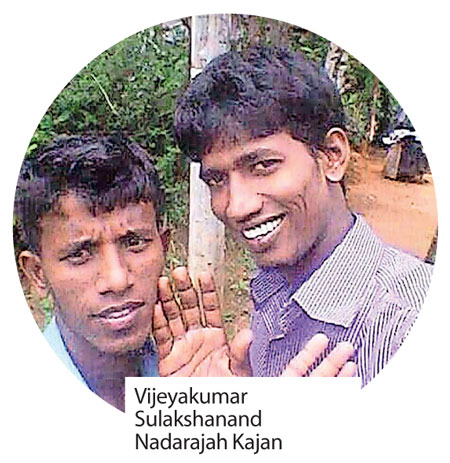 On a different platform, Jaffna students’ deaths raise the question “does President Sirisena’s continued political positioning within Sinhala Buddhist sentiments with a heavy stress on security forces, exhibit a living political duality?”
On a different platform, Jaffna students’ deaths raise the question “does President Sirisena’s continued political positioning within Sinhala Buddhist sentiments with a heavy stress on security forces, exhibit a living political duality?”
His immediate intervention in having a team from Colombo to probe the “murders” and arrest suspects, does not project any duality in his politics. These are political compromises politicians are most often pushed to make when confronted with unforeseen and sudden crises. Issues that demand “damage controlling” before they trigger off mass protests. Issues that could even raise international concerns. Thus Presidential intervention was necessary as police action was not trusted from the first media statement itself. Despite the Presidential intervention, investigations on the Jaffna student murder would need continued and careful public watch. For that reason alone, though heavily criticised, President Sirisena’s allegations on political decisions in investigations should be taken seriously. As he alleged, not only the CID and the FCID, but also the Police Department itself works on different agendas.
Not just the Bribery Commission, but all Independent Commissions have failed miserably, raising the question, “how relevant are Independent Commissions now?”
Except the yet to be fully constituted RTI Commission that is different to all other “commissions”, and to a certain extent the HRCSL, presently constituted commissions have all failed to perform even minimally.
The Elections Commission (EC) is either inefficient or succumbs to political pressure, or both, despite populist rhetoric of its Chairman. The Commissioner of Elections before and now the EC, together have not proved they could have the De-limitation Commission report done for over 02 years to date. 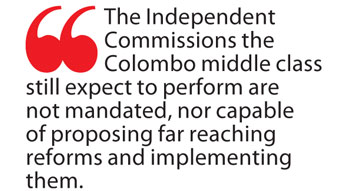
It is the political leadership in the government that decides every postponement of LG elections. What independence is there in the EC when it continues to justify the political decision of this government in postponing LG elections?
What of the Police Commission (PC)? The police continue to behave as they did before. This is one aspect of President Sirisena’s angered remarks that goes without due attention.
Even with the recent Embilipitiya murder, the PC did not stand up to its expected mark. The role of the FCID is in question.
It is argued that the FCID is an investigating unit in the Police Department under the IGP. It should then come under the supervision of the PC. Police are as usual under political influence as suspected with the most recent Colombo Night Club fiasco where fingers were pointed at the President’s son. This cannot be so, if the PC is in authority over them. So are other agencies, including the Bribery Commission. Relevance and validity of Independent Commissions have therefore come to be questioned. Serious discussions on Independent Commissions began over 16-17 years ago. The OPA was also involved in putting together the draft framework for Independent Commissions. Lobbying political leaderships to accept independent commissions were a difficult task.
Both mainstream parties were reluctant in giving it the nod. Prime Minister Ranil Wickremesinghe, as the leader of the UNP, and in the Opposition bought time through different party committees.
The 17th Amendment to establish Independent Commissions was finally adopted and certified 15 years ago on 03 October, 2001, when JVP compromised with the Chandrika Kumaratunga government. Necessity to establish Independent Commissions was then felt very much with growing political interference in the functioning of the State. The argument was, de-linking important State bodies from Presidential and Ministerial supervision and authority would allow for independent functioning of the State.
Initially, State media was also to be brought under an Independent Commission, but was dropped and remains dropped to date. With a very strong need felt to have “free and fair elections” the demand for an Independent Elections Commission was foremost.
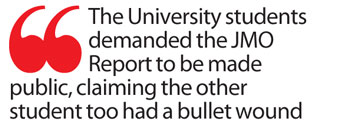 In short, Independent Commissions were proposed as the best remedy in de-politicising the State.
In short, Independent Commissions were proposed as the best remedy in de-politicising the State.
Reluctance in having them was given practical meaning with Chandrika Kumaratunga government scuttling the establishment of Independent Commissions and their functioning. The Wickramasinghe government from December 2001 to April 2004 was also not interested in them.
In between then and now and passing through the Rajapaksa era, deterioration of the State has gone from bad to worse to intolerably low.
The issue is no more restricted to de-politicisation of the State. From Ministry Secretaries, department heads to District Secretaries and down to Grama Seva Niladharies, the whole State administration is politicised at every level.
Politicisation has led to corruption and inefficiency too. So, is law enforcement and the rule of law. The Police Department undoubtedly needs serious reforms to have it as a civil department with public acceptance and trust.
Interpreting re- establishment of “independence of the judiciary” in terms of replacing a politically appointed Chief Justice through an equally flawed process, was nowhere near an answer to the actual issues that weigh in on the Judiciary.
The independence of the Judiciary needs to be discussed in the context of efficiency and a clean Judiciary. The crisis is now many faceted and is deepening.
Independent Commissions as proposed and adopted 15 years ago is no match to the present crisis.
The present crisis in the functioning of the State, apart from demanding far reaching radical “reforms”, is politically tied to the issue of cleaning up and democratising political parties too. Political leaderships are corrupt, arrogant and part of the total garbage that has to be disposed of. Their arrogance in continuing with this corrupt and politicised State was clearly evident in how they went about writing the 19A to the Constitution.
The Constitutional Council (CC) that has to decide on independent commissions was heavily compromised to include 07 parliamentarians out of the 10 members. That very compromise totally contradicted the necessity to have an A-Political, respected and reputed Council. The three Councillors who are expected to represent the civil society are no civil society representatives, serving political needs of this very corrupt “unity” government. The three civil society representatives in the CC were never heard on any controversy there were in appointing members to Independent Commissions.
The result was that all commissions were compromised to fit into the political agenda of this government. They are therefore not independent and lack public trust.
The Independent Commissions the Colombo middle class still expect to perform are not mandated, nor capable of proposing far reaching reforms and implementing them. Thus we have now come to a different stage in political degeneration, Independent Commissions have to be left aside to work towards far reaching, radical reforms through a “Public Commission on State and Political Reforms”.
A difficult decision for this society to agree to, but one that needs to be lobbied for.

Add comment
Comments will be edited (grammar, spelling and slang) and authorized at the discretion of Daily Mirror online. The website also has the right not to publish selected comments.
Reply To:
Name - Reply Comment
US authorities are currently reviewing the manifest of every cargo aboard MV
On March 26, a couple arriving from Thailand was arrested with 88 live animal
According to villagers from Naula-Moragolla out of 105 families 80 can afford
Is the situation in Sri Lanka so grim that locals harbour hope that they coul